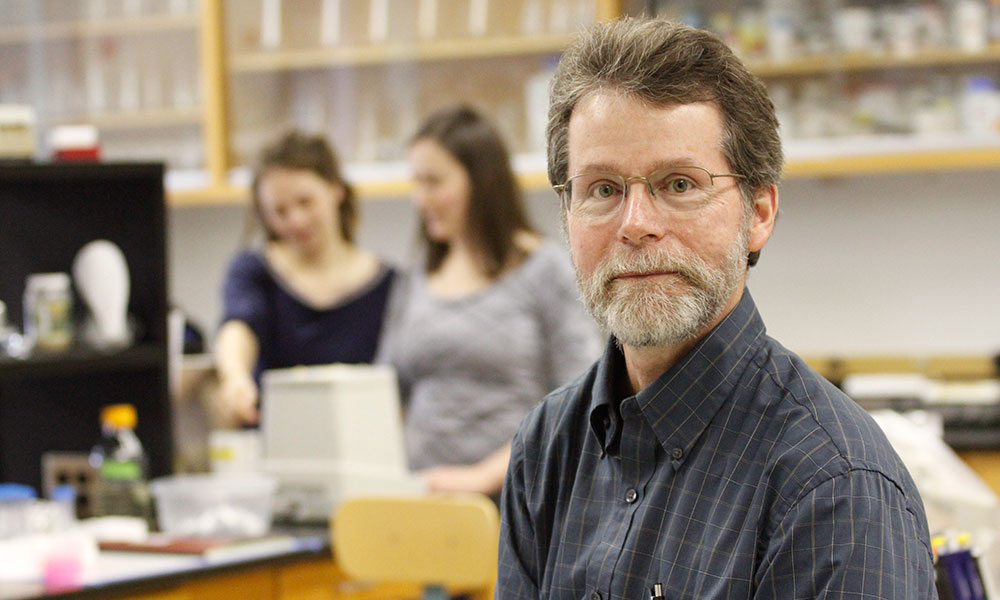A patented approach
Research could lead to new athelte's foot remedy
News
SUMMARY: JMU biologist getting patent for potential athlete's foot remedy
What's good for salamanders and frogs may also be good for human feet.
JMU biologist Reid Harris was notified recently that a patent will be granted for an idea he and a colleague came up with to treat athlete's foot—and other skin fungal infections—using a skin probiotic. It is the same approach that has brought international attention to Harris for his research into combating a deadly fungus that is wiping out amphibians around the world.
Dr. Kevin Minbiole, an assistant professor of chemistry at Villanova University and a former member of the JMU chemistry faculty, worked with Harris on the idea and is also named on the patent.
"Probiotics use beneficial organisms to help us in some way," Harris said. "We usually think of probiotics in terms of yogurt, which supply beneficial bacteria to our digestive tract, which can help defend against pathogenic bacteria. And so we thought maybe this same concept could be applied to the skin to either treat or prevent something like athlete's foot fungus. And there are other types of skin-fungal diseases people can get, especially in the tropics."
Current athlete's foot treatments involve drugs, but bacteria would be more effective because the treatments wouldn't need to be repeated, Harris said. "The promise of a probiotic is that it could become somewhat self-sustaining. The probiotic would produce a chemical that would kill the fungus. If you could get the bacteria established on the skin at some level, it may be able to work continually. It could also be a preventive treatment for people who are prone to get athlete's foot by preventing colonization of the fungus in the first place."
Harris and Minbiole came up with the idea while collaborating on research to use naturally occurring bacteria on the skin of amphibians to fight the deadly fungus Batrachochytrium dendrobatidis (Bd), which suffocates frogs and salamanders by hampering their ability to breathe through their skin.
"Kevin and I came up with this idea, but we're not really in a position, given our other research and teaching interests, to be the ones to start a company at this point," Harris said. "We're looking for somebody else out there who is willing to develop this concept."
Mary Lou Bourne, director of technology transfer at JMU, is leading the search for companies that might be interested in licensing the patent. Years of product development and testing will be required to take the idea from theory to practice. "It's like any idea at this stage," Harris said. "It could go nowhere or it could really end up being helpful and a big thing."
Minbiole said, "Some of the most exciting ideas come from simple chats between people with different backgrounds. In our case, a chat at The Little Grill between a biologist and a chemist led to an unconventional strategy to fight athlete's foot."
It has taken about four years for the patent application to progress through the patent examination system to receive the notice of allowance. Harris encourages other faculty members who think they might have a patentable idea to work with Bourne. "It has been an absolute pleasure working with Mary Lou and she really made the process very easy," he said.
Bourne said it is important to begin the intellectual property disclosure process soon after discovering an idea might be useful and that there is interest in it. To receive a patent, ideas have to be novel, useful, non-obvious and beneficial to society, she said.
Harris said, "The research that Kevin and I were doing was really basic science research on amphibian diseases and amphibian ecology and disease ecology and if something does come out of this, it's an example of how research on something that seems fairly unrelated might end up having strong applications that benefit humans."
Minbiole said, "Knowing that our research is at a level that could warrant commercialization sends a powerful message about what impact undergraduate research can have."
